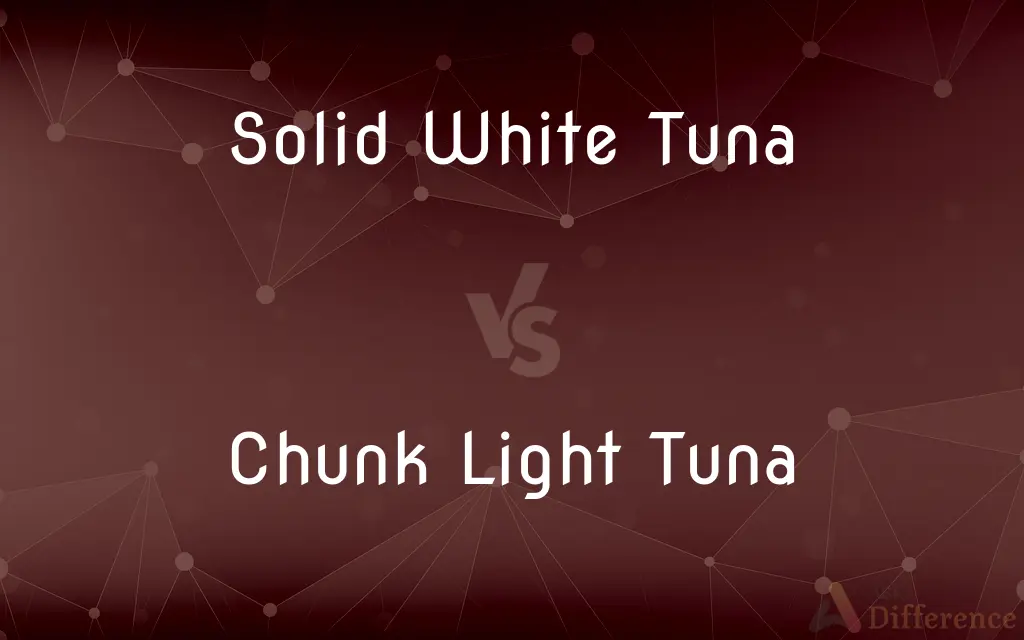Solid White Tuna vs. Chunk Light Tuna — What's the Difference?
Edited by Tayyaba Rehman — By Fiza Rafique — Published on November 9, 2023
Solid White Tuna is albacore tuna with firm, light-colored meat; Chunk Light Tuna is usually skipjack or yellowfin with a darker, flakier texture.

Difference Between Solid White Tuna and Chunk Light Tuna
Table of Contents
ADVERTISEMENT
Key Differences
Solid White Tuna, typically sourced from the albacore species, is known for its mild flavor and steak-like consistency. It possesses a light color, which gives it its 'white' moniker. In contrast, Chunk Light Tuna, derived mainly from skipjack or yellowfin species, presents a stronger taste and darker hue.
One primary distinction between Solid White Tuna and Chunk Light Tuna is their packaging presentation. Solid White Tuna, as its name suggests, is packed as a solid piece, retaining its form. On the other hand, Chunk Light Tuna comes in smaller, flaky pieces, providing a chunkier consistency.
From a nutritional perspective, Solid White Tuna often contains higher levels of mercury due to the larger size and longer lifespan of the albacore species. Conversely, Chunk Light Tuna typically has lower mercury levels, making it a preferred choice for those monitoring their mercury intake.
Price points also vary between Solid White Tuna and Chunk Light Tuna. Generally, Solid White Tuna is priced higher due to its mild flavor and solid presentation, while Chunk Light Tuna, given its stronger taste and chunky texture, is more budget-friendly.
While both Solid White Tuna and Chunk Light Tuna are popular choices for tuna salads, sandwiches, and recipes, personal preference regarding texture and flavor will dictate the best choice for different culinary applications.
ADVERTISEMENT
Comparison Chart
Source Species
Albacore
Skipjack or Yellowfin
Meat Texture & Color
Firm, light-colored meat
Darker, flakier texture
Mercury Levels
Typically higher
Typically lower
Price Point
Generally higher
More budget-friendly
Common Culinary Applications
Tuna salads, sandwiches with a smoother texture
Tuna salads, dishes requiring a chunkier texture
Compare with Definitions
Solid White Tuna
Tuna with a firm, steak-like texture.
Solid White Tuna holds its shape well in sandwiches.
Chunk Light Tuna
Tuna with a darker, flaky texture.
Chunk Light Tuna is perfect for chunky tuna salad.
Solid White Tuna
Tuna from the albacore species.
I prefer Solid White Tuna for its mild flavor.
Chunk Light Tuna
Contains lower mercury levels than albacore.
Chunk Light Tuna is my go-to for frequent consumption.
Solid White Tuna
Typically higher in mercury content.
Be cautious with frequent consumption of Solid White Tuna due to its mercury levels.
Chunk Light Tuna
Tuna primarily from skipjack or yellowfin species.
For a stronger tuna flavor, I opt for Chunk Light Tuna.
Solid White Tuna
Often sold at a premium price.
I'm willing to pay a bit more for Solid White Tuna because of its taste.
Chunk Light Tuna
Tuna sold in smaller, broken pieces.
I enjoy the textured feel of Chunk Light Tuna in my recipes.
Solid White Tuna
Tuna with a light-colored meat.
The light hue of Solid White Tuna is visually appealing in salads.
Chunk Light Tuna
A budget-friendly tuna option.
When shopping on a budget, Chunk Light Tuna is my choice.
Common Curiosities
Is there a mercury difference between Solid White Tuna and Chunk Light Tuna?
Yes, Solid White Tuna generally has higher mercury levels than Chunk Light Tuna.
Are there specific dishes where Solid White Tuna is more preferred?
Solid White Tuna is often preferred in dishes where a smooth texture, like certain tuna salads and sandwiches, is desired.
How does the texture of Solid White Tuna compare to Chunk Light Tuna in dishes?
Solid White Tuna offers a firmer, smoother texture, while Chunk Light Tuna provides a chunkier consistency.
Why might someone choose Chunk Light Tuna over Solid White Tuna?
Chunk Light Tuna is chosen for its stronger flavor, lower mercury content, and budget-friendly price.
What species is Solid White Tuna typically sourced from?
Solid White Tuna is typically sourced from the albacore species.
Which tuna variety has a darker and flakier texture?
Chunk Light Tuna has a darker and flakier texture.
Which type of tuna is more budget-friendly?
Chunk Light Tuna is usually more budget-friendly than Solid White Tuna.
Can I interchange Solid White Tuna and Chunk Light Tuna in recipes?
Yes, but the dish's texture and flavor will vary depending on the tuna type.
What's a primary packaging difference between the two tunas?
Solid White Tuna is packed as a solid piece, while Chunk Light Tuna comes in smaller, flaky pieces.
Which type of tuna is typically lighter in color?
Solid White Tuna is typically lighter in color compared to Chunk Light Tuna.
Are both tunas equally popular in culinary dishes?
Both are popular, but the choice depends on personal preferences and the desired dish's texture and flavor.
Is the taste noticeably different between Solid White Tuna and Chunk Light Tuna?
Yes, Solid White Tuna has a milder flavor, while Chunk Light Tuna has a more pronounced tuna taste.
How does the mercury content of the two tunas compare?
Solid White Tuna often contains higher mercury levels compared to Chunk Light Tuna.
Why is Solid White Tuna usually priced higher?
Solid White Tuna is priced higher due to its mild flavor, solid presentation, and being sourced from the albacore species.
Which type of tuna is generally seen as a more premium product?
Solid White Tuna is generally seen as more premium than Chunk Light Tuna.
Share Your Discovery

Previous Comparison
Almond Essence vs. Almond Extract
Next Comparison
Extensive Reading vs. Intensive ReadingAuthor Spotlight
Written by
Fiza RafiqueFiza Rafique is a skilled content writer at AskDifference.com, where she meticulously refines and enhances written pieces. Drawing from her vast editorial expertise, Fiza ensures clarity, accuracy, and precision in every article. Passionate about language, she continually seeks to elevate the quality of content for readers worldwide.
Edited by
Tayyaba RehmanTayyaba Rehman is a distinguished writer, currently serving as a primary contributor to askdifference.com. As a researcher in semantics and etymology, Tayyaba's passion for the complexity of languages and their distinctions has found a perfect home on the platform. Tayyaba delves into the intricacies of language, distinguishing between commonly confused words and phrases, thereby providing clarity for readers worldwide.













































